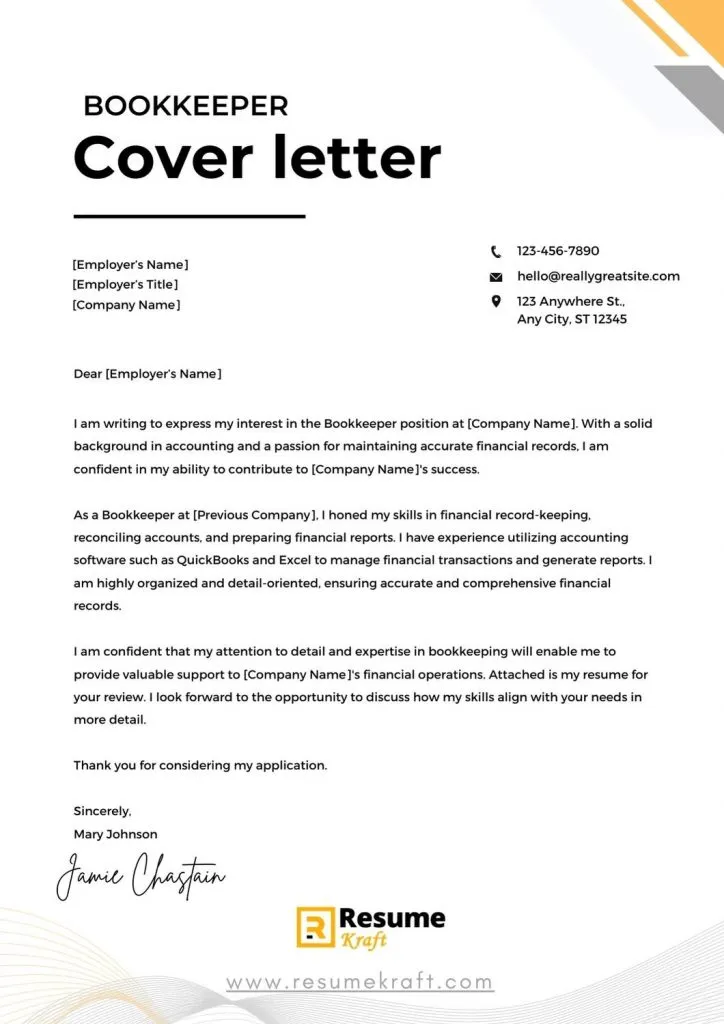Why You Need a Great Bookkeeper Cover Letter
In the competitive world of bookkeeping, a well-crafted cover letter can be your golden ticket to landing your dream job. A cover letter serves as your first impression, providing an opportunity to showcase your skills, experience, and personality beyond what a resume can convey. It’s a crucial tool for highlighting why you’re the perfect fit for a specific role and demonstrating your genuine interest in the company. In the bustling landscape of accounting, a standout cover letter can make the difference between getting your application noticed or ending up in the discard pile. It is your chance to tell a story and connect with the hiring manager on a personal level. By taking the time to craft a compelling cover letter, you increase your chances of securing an interview and ultimately, the job.
What to Include in Your Bookkeeper Cover Letter
Creating a comprehensive cover letter involves including key elements that effectively communicate your qualifications and enthusiasm. Your cover letter should be a blend of professional communication and personal flair. It should highlight the essential components that will help you stand out. Ensure you address the specific requirements of the job posting and tailor your letter to reflect your understanding of the company’s needs. This approach ensures your application is both informative and engaging. Start by including your contact details, a clear introduction, a strong demonstration of your bookkeeping skills, specific examples of your experience and achievements, evidence of your software proficiency, an articulation of your professionalism, and a tailored conclusion. A well-structured cover letter not only presents your qualifications but also shows that you are serious about the opportunity, making a compelling case for your candidacy.
Contact Information and Introduction
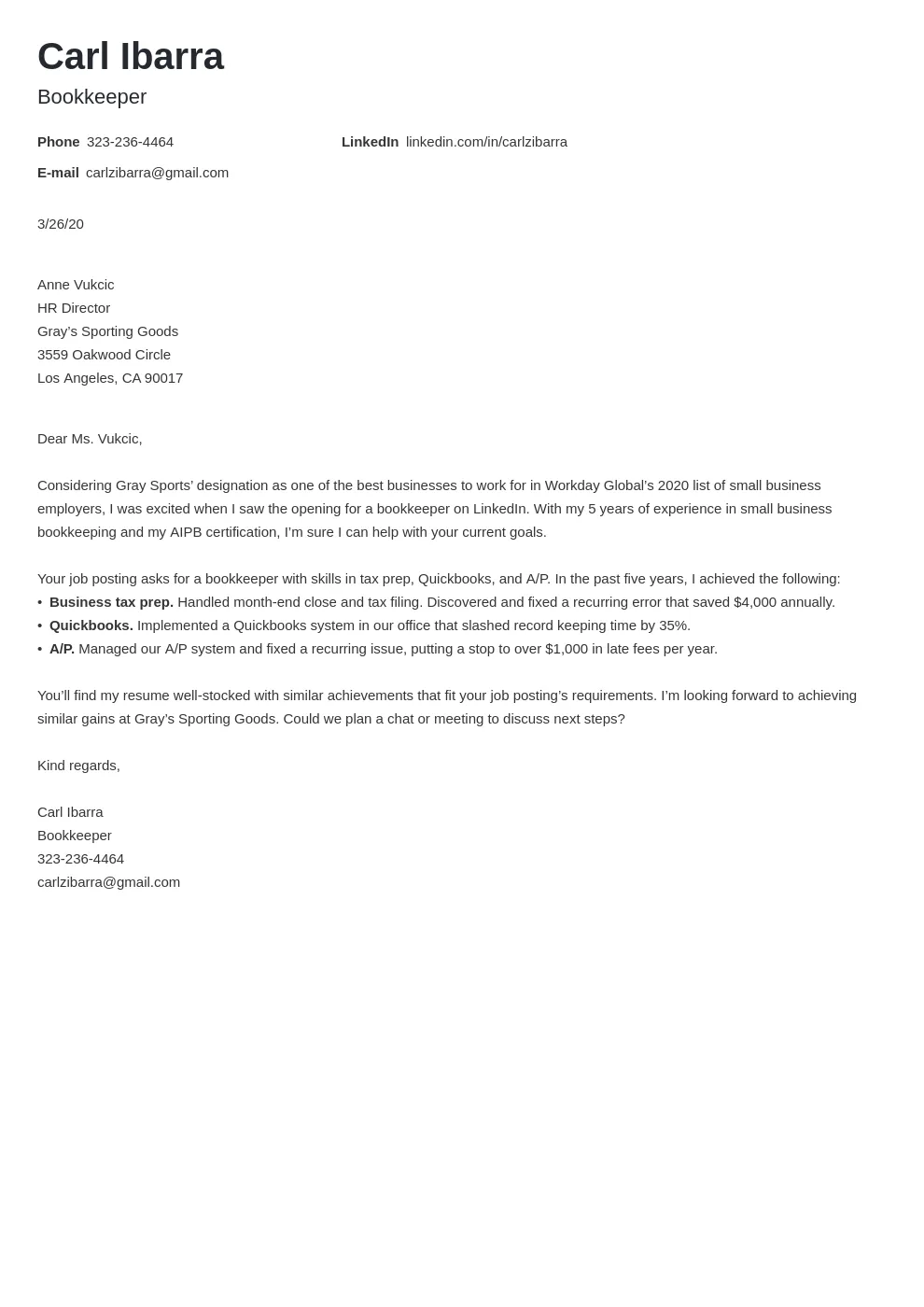
Start your cover letter with your contact information, including your name, phone number, email, and LinkedIn profile (if applicable). Address the hiring manager by name, if possible; otherwise, use a professional salutation. In your introduction, clearly state the position you are applying for and briefly mention how you learned about the opportunity. This sets the stage for the rest of your letter and shows your interest in the role. A strong opening captures the reader’s attention. Be concise and enthusiastic and immediately establish your intention to be considered for the role, demonstrating a proactive approach. Your introduction should be well-crafted, setting the right tone and signaling to the hiring manager that you are a serious candidate.
Highlighting Your Bookkeeping Skills
This is your chance to shine! Clearly articulate your core bookkeeping skills, such as accounts payable and receivable, general ledger management, bank reconciliations, and financial reporting. Mention any specialized skills like payroll processing, tax preparation, or budgeting. Use keywords from the job description to demonstrate that you meet the requirements of the role. Focus on the skills that are most relevant to the position and provide specific examples of how you have utilized these skills in the past. Your goal is to provide a concise overview of your capabilities. This not only shows that you possess the necessary competencies but also helps the hiring manager quickly assess your suitability for the role. A well-articulated skills section increases your chances of making a positive impression.
Experience and Achievements
Provide details about your relevant work experience, including the company name, job title, and dates of employment. Briefly describe your responsibilities and achievements in each role. Focus on accomplishments rather than just listing your duties. For each position, highlight the contributions you made, such as improving efficiency, reducing costs, or streamlining processes. Quantify your achievements whenever possible to demonstrate the impact of your work. This will help the hiring manager understand the value you can bring to their company. The experience section of your cover letter is an important opportunity to illustrate the evolution of your career and the impact that you have made at each step of your journey. Each accomplishment gives the reader a clear understanding of your skills.
Quantify Your Accomplishments
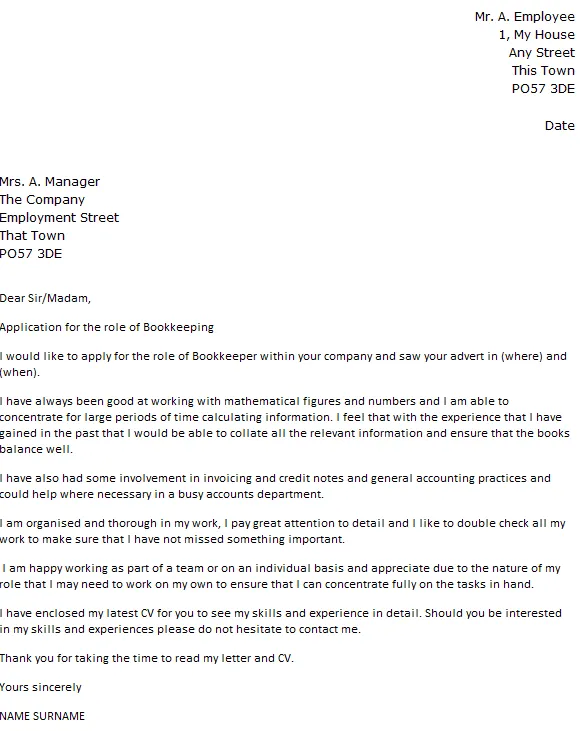
Whenever possible, quantify your achievements to provide concrete evidence of your impact. Use numbers, percentages, and specific figures to illustrate your accomplishments. For example, instead of saying “Improved accuracy,” you could say “Improved accuracy by 15% through the implementation of new reconciliation procedures.” Quantifying your achievements adds credibility to your claims and demonstrates the tangible benefits you have provided in previous roles. This will help the hiring manager understand the specific value you bring and why you are a strong candidate for the position. The more you use measurable data to support your claims, the more compelling your cover letter will become. By using these figures, you immediately distinguish yourself from other applicants.
Demonstrating Software Proficiency
In today’s digital age, proficiency in accounting software is essential. List the software you are proficient in, such as QuickBooks, Xero, Sage, or any other relevant programs. Specify your level of expertise with each software. If the job description mentions specific software, be sure to highlight your experience with those programs. Providing details about your software knowledge directly addresses a key requirement for most bookkeeping positions and increases your chances of making a favorable impression. This also shows that you have the technical competencies required to perform the job effectively. Including this section is essential for demonstrating your ability to work with modern accounting tools.
Showcasing Your Professionalism
Showcasing your professionalism involves highlighting soft skills that are critical in the bookkeeping field. Mention your attention to detail, organizational skills, ability to meet deadlines, and communication skills. Emphasize your commitment to accuracy, confidentiality, and ethical conduct. Provide examples of how you have demonstrated these qualities in your previous roles. This demonstrates that you are not only skilled but also a reliable and trustworthy professional. Displaying your professionalism will reassure the hiring manager that you are the right fit for their team. Your professional demeanor is as important as your technical skills, so make sure to emphasize it in your cover letter.
Tailoring Your Cover Letter to the Job
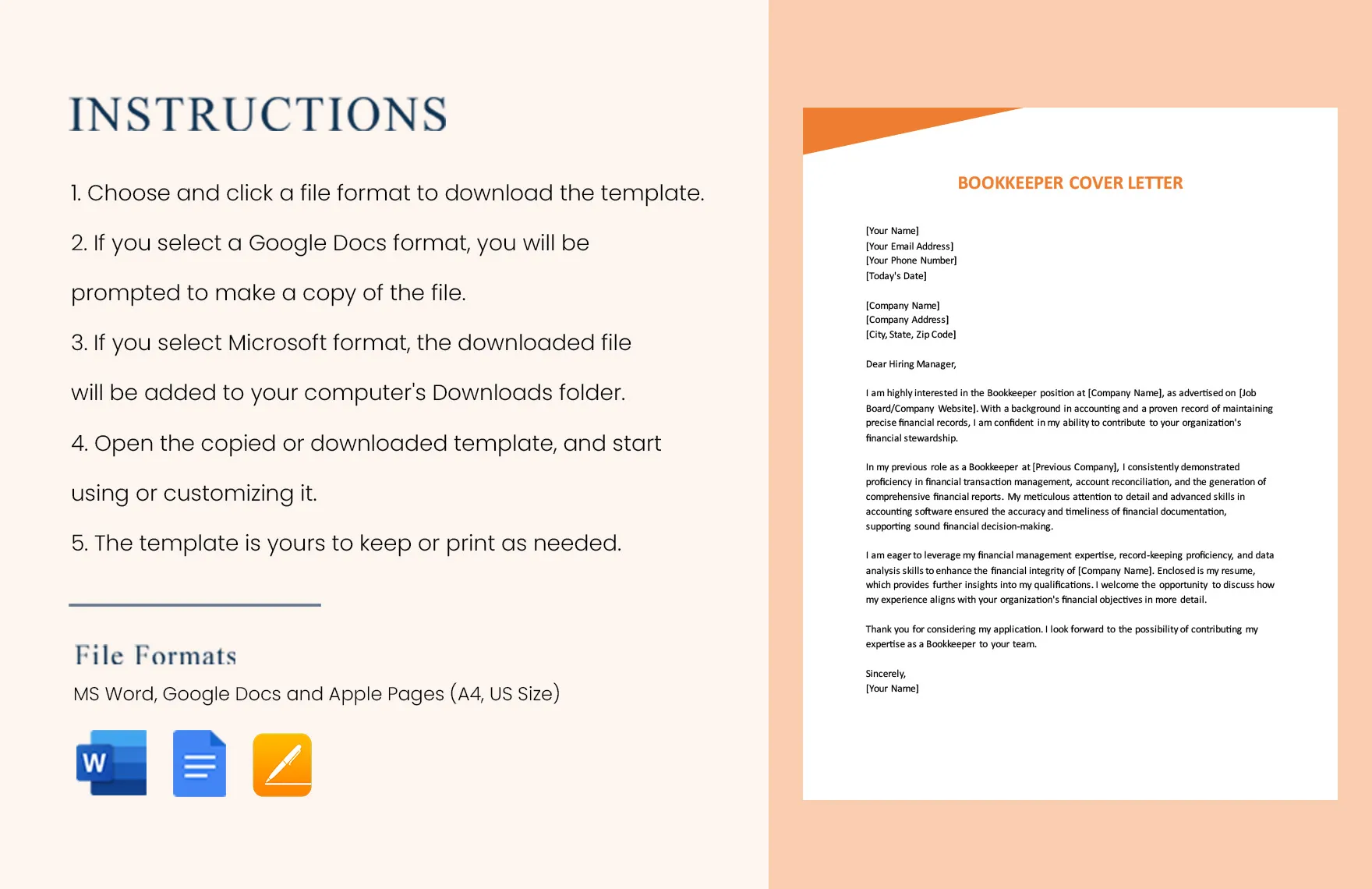
Customize your cover letter for each job application. Review the job description carefully and tailor your letter to match the specific requirements and keywords. Highlight the skills and experiences that align with the job requirements and demonstrate how you can contribute to the company’s goals. Make sure to mention why you are interested in the specific role and company. This personalization demonstrates your genuine interest in the opportunity and shows that you have taken the time to understand the role and the organization. Your cover letter will stand out, and show a deeper understanding of the role and its requirements. This level of attention will significantly increase your chances of getting an interview.
Researching the Company
Before writing your cover letter, research the company. Understand their business, values, and culture. Mention something specific about the company that resonates with you to show that you have done your homework. This demonstrates your interest and initiative. Researching the company will give you insights that you can use to customize your cover letter. Tailor your letter to address the company’s needs and show them how your skills and experience align with their objectives. The more you know about the company, the better you can position yourself as a valuable candidate. This will add a personal touch to your application and make you more memorable.
Matching Skills to Job Requirements
Carefully review the job description and identify the key skills and qualifications the employer is seeking. Match your skills and experience to these requirements, emphasizing the most relevant aspects. Use keywords from the job description to show that you possess the required competencies. This ensures that your cover letter directly addresses the employer’s needs, making your application more likely to be noticed. By highlighting your skills, you can show the hiring manager that you are the perfect fit for the role. This targeted approach increases the effectiveness of your cover letter, helping you stand out from other applicants and increase your chances of securing an interview.
Proofreading and Formatting
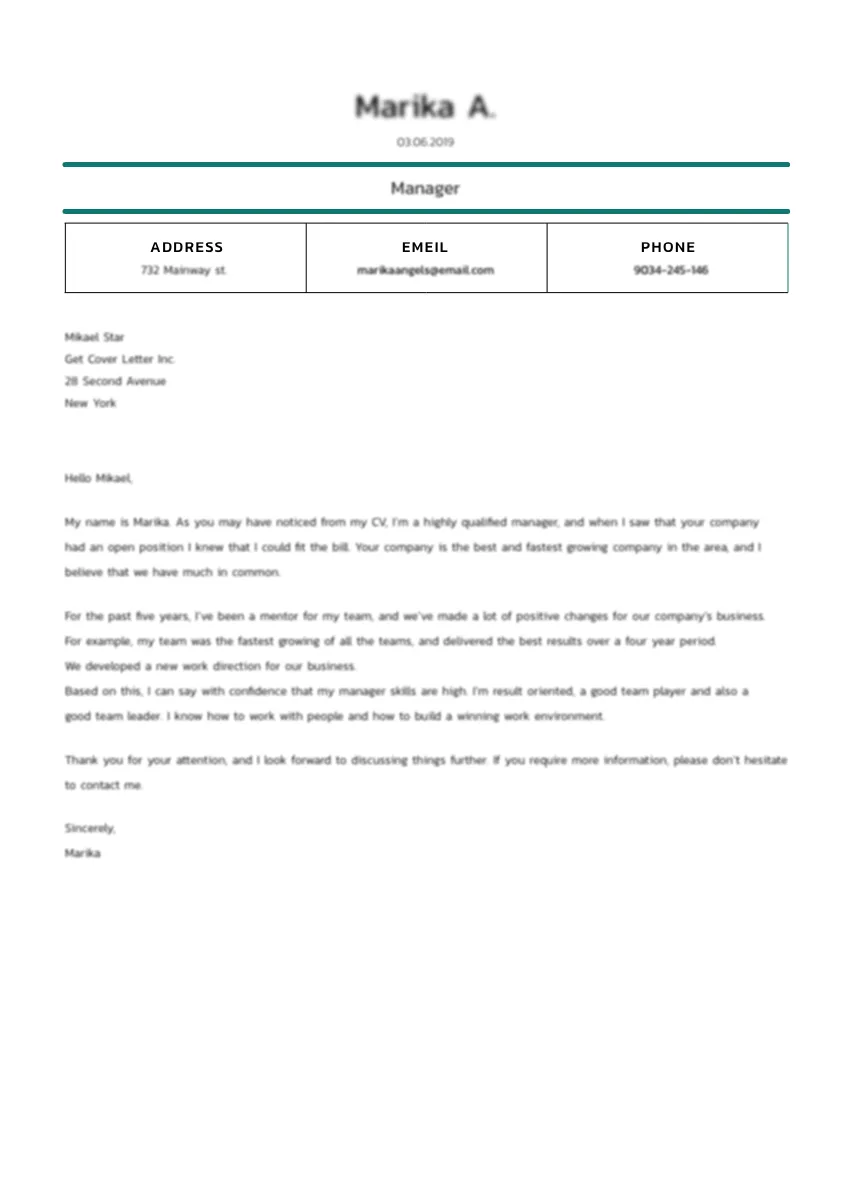
Thoroughly proofread your cover letter for any errors in grammar, spelling, and punctuation. Errors can undermine your credibility and detract from your qualifications. Use a clean, professional format, with clear fonts and proper spacing. Ensure your letter is easy to read and visually appealing. Ask someone else to review your cover letter for any errors. A fresh pair of eyes can often catch mistakes you might have missed. Paying attention to the details of your cover letter demonstrates professionalism and attention to detail, which are highly valued in the bookkeeping field. By ensuring it is polished and error-free, you make a great first impression.
The Importance of a Strong Conclusion
Your conclusion is your last chance to make a strong impression. Summarize your key qualifications and reiterate your interest in the position. Restate your value and how you can contribute to the company. Keep it concise and focused on what you can offer. A well-crafted conclusion reinforces the main points of your cover letter. Make sure that it leaves the hiring manager with a positive impression of your abilities and enthusiasm. End your letter on a high note, making sure to thank the hiring manager for their time and consideration. This can improve your chances of getting an interview.
Call to Action
Include a clear call to action in your conclusion. Express your enthusiasm for an interview and provide your contact information. Make it easy for the hiring manager to reach you. Indicate your availability for an interview and restate your excitement about the opportunity. A strong call to action encourages the hiring manager to take the next step. It shows that you are proactive and eager to move forward in the hiring process. This final step ensures that your application leaves a lasting impression and increases your chances of securing an interview.
Cover Letter Dos and Don’ts
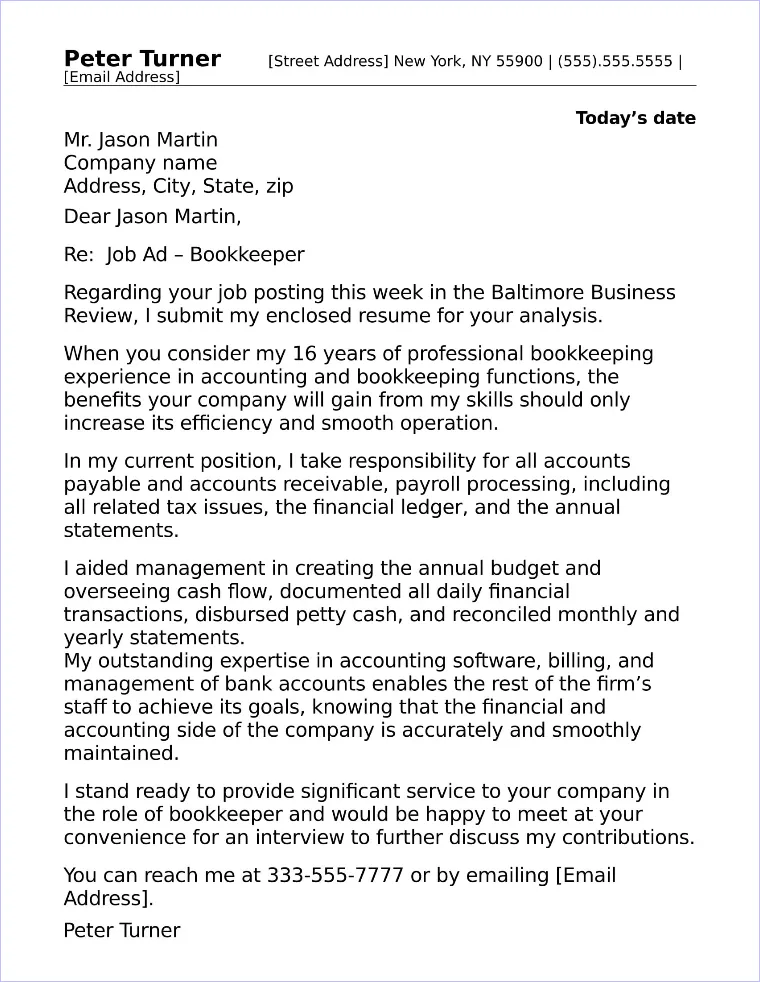
Dos for Bookkeeper Cover Letters
Do tailor your cover letter to each job. Do highlight your skills and experiences relevant to the job description. Do quantify your accomplishments whenever possible. Do proofread carefully for any errors. Do use a professional format and tone. Do research the company and mention something specific that resonates with you. Do include a clear call to action, expressing your interest in an interview. Following these simple steps can ensure you make a great first impression. Writing a cover letter is a good way to illustrate your ability to communicate clearly and concisely. This can greatly improve your chances of making the cut.
Don’ts for Bookkeeper Cover Letters
Don’t use generic templates without personalization. Don’t make the letter too long; aim for one page. Don’t focus solely on your job duties. Don’t include irrelevant information. Don’t make any spelling or grammatical errors. Don’t forget to proofread carefully. Don’t use a casual or unprofessional tone. Staying away from these pitfalls will help to showcase your professionalism. Writing an effective cover letter can significantly increase your chances of getting an interview.
Example Cover Letter for Bookkeepers
Here is a sample cover letter to help you get started. [Your Name][Your Address][Your Phone Number][Your Email] [Date][Hiring Manager Name (if known), or ‘Hiring Team’][Company Name][Company Address]Dear [Hiring Manager Name or To Whom It May Concern],I am writing to express my keen interest in the Bookkeeper position at [Company Name], as advertised on [Platform where you saw the ad]. With over [Number] years of experience in bookkeeping and a proven track record of accuracy and efficiency, I am confident that my skills and experience align perfectly with the requirements of this role. In my previous role at [Previous Company], I was responsible for managing accounts payable and receivable, performing bank reconciliations, and preparing financial reports. I successfully streamlined the accounts payable process, reducing processing time by 15%. I have experience with accounting software such as QuickBooks, Xero, and Sage. My strong attention to detail, organizational skills, and ability to meet deadlines make me a valuable asset to any accounting team.I am particularly drawn to [Company Name] because of [Mention something specific that interests you about the company]. I am excited about the opportunity to contribute to your team’s success and believe my skills and experience would be a great asset.Thank you for considering my application. I have attached my resume for your review and look forward to the opportunity to discuss my qualifications further in an interview.Sincerely,[Your Name]
